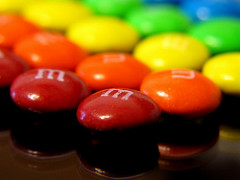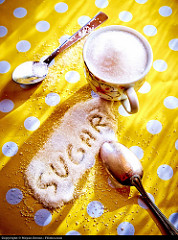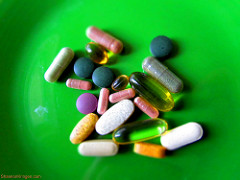I was diagnosed with ADHD last year after my 9 year old son was also diagnosed. We are both taking stimulant medication as this is the most effective way of controlling our ADHD symptoms.
After realising we have ADHD I went on a journey of discovery of ways in which to help us. All the information given here is what I have found from various sources and I have formed my own view based on this. I am not a nutritionist but a person with this condition looking for ways to help me and my family.
I must start by saying ADHD is not caused by bad eating habits! Nutrition improves health in everyone. It improves health in an ADHD individual, not by treating or improving the ADHD but by improving overall health and function the same as anyone else. If you have a poor diet and improve it, or are lacking in essential vitamins/minerals you may see a marked improvement.
However I believe certain foods can make the symptoms worse and some are clearly beneficial to maximising alertness and energy levels and keeping the body balanced without peaks in blood sugar levels. So to my mind nutrition is really important for everyone but more so for people with ADHD who are working at a lower level due to the lack of Dopamine in the brain.
Brain cells, like other cells in the body, need proper nutrition to carry out their functions and needs the right levels of nutrients to speed transmission of the electrical signals between brain cells; neurotransmitters, dopamine, serotonin, and norepinephrine, are dependent on diet for their production. So a good balanced diet is going to at least aide this transmission.

I have listed below the food groups to focus on and why:
Fats and fish oil
Most important to brain function are the two essential fatty acids found in fish oil, linoleic (or omega- 6) and alpha linolenic (or omega-3).
Fatty acids perform a number of functions in the brain, such as affecting transmission of the neurotransmitters dopamine and seratonin and helping brain cells to communicate. Some evidence suggests that children with ADHD may have low levels of essential fatty acids.
So foods such as tuna, salmon and other cold-water fish, soybeans, walnuts, wheat germ, pumpkin seeds and eggs are great examples. Flaxseed and canola oils are also good sources of omega-3’s.

Complex carbs
The rate at which sugar from a particular food enters brain cells, and other cells of the body, is called the “glycemic index” (GI). Foods with a high glycemic index stimulate the pancreas to secrete high levels of insulin, which causes sugar to empty quickly from the blood into the cells. Insulin regulates the ups and downs of blood sugar, and the rollercoaster behaviour that sometimes goes with them. Low-glycemic foods deliver a steady supply of sugar, helping a person with ADHD control behaviour and improve performance.
So complex carbs sustain long periods of energy for the body without raising the blood sugar levels and are often rich in fibre and also helps brain function and mood. An example of foods to eat are green vegetables, whole grains such as wholemeal bread, wholegrain pasta and oatmeal. Starchy vegetables such as potatoes, sweet potatoes, corn and pumpkin, beans, lentils and peas are also good sources.

Protein
A balanced diet, rich in protein is recommended for people with ADHD, as the body makes brain awakening neurotransmitters when eating protein and it doesn’t create a surge in blood sugar levels which can increase hyperactivity.
ADHD medication can cause a lack of appetite in many people, myself and my son included, so breakfast tends to be the most important meal of the day, particularly for my growing boy! So we tend to make sure there is some protein at all mealtimes but breakfast being the most important meal as its before he takes his medication, so this is the meal where he is the hungriest.
Ideas would be such things like poached eggs on wholemeal toast, cheese, sausages, bacon, baked beans or yoghurt. My son loves cereals so we tend to combine non sugary wholegrain cereals with whole milk along with something from the protein items listed above.

Another great idea would be a fruit and vegetable smoothie packed full of your 5 a day (berries or pineapple and cherries, yoghurt, green vegetables such as chard, spinach, kale, fruit juice and whey protein powder. This would be a great power up breakfast or an after school pick me up.
5-a-day
This goes for everyone not just people with ADHD but is so important for a balanced diet.
- Fruit and vegetables area good source of vitamins and minerals, including folate, vitamin C and potassium.
- They’re an excellent source of dietary fibre, which canhelp to maintain a healthy gut and prevent constipation and other digestion problems. A diet high in fibre can also reduce your risk of bowel cancer.
- They can help to reduce your risk of heart disease, stroke and some cancers.
Fruit and vegetables contribute to a healthy, balanced diet.

Food colourings, preservatives and additives
Food additives include artificial colours, artificial sweeteners and preservatives. There’s no solid evidence that food additives cause ADHD. However, the topic of food additives and their possible effects is controversial.
Some studies indicate that certain food colourings and preservatives may increase hyperactive behaviour in some children. But the Food and Drug Administration (FDA) Food Advisory Committee determined that studies to date have not proved there is a link between food colourings and hyperactivity. I think its a case of trial and error on each individual.
However according to the NHS eliminating some colours from our diet might have beneficial effects on behaviour. These are found in a number of foods including soft drinks, sweets, cakes and ice-cream. These colours include:
- sunset yellow (E110)
- quinoline yellow (E104)
- carmoisine (E122)
- allura red (E129)
- tartrazine (E102)
- ponceau 4R (E124)

Sugar (simple carbs)
Simple carbs are raw sugar, brown sugar, corn syrup, glucose, fructose, sucrose and fruit juice concentrate. Many studies have found no correlation between sugar and increased hyperactivity in ADHD children, other studies on nutrition suggest that some ADHD children are affected by sweet food stuffs. For us yes this is definitely true!
My personal view is sugar does affect my son’s behaviour and his ADHD. I discovered this some years ago when quite innocently I gave him tinned peaches in syrup. What happened next was shocking, he went into overdrive and was bouncing off the walls! I tried it again to make sure it was indeed this and yes. So my advice is to limit it and watch out for those food colourings too.

Sleep and nutrition
Sleep is often difficult for people with ADHD and the medication prescribed can interrupt the natural ability to go to sleep, this is more often found in children as for me personally I can sleep without too much trouble. However my son is different. Melatonin is a hormone that helps control your sleep and wake cycles. Eating certain foods help boost Melatonin. Such foods as pineapple, bananas, oats, oranges and cherries are a few good examples.
I have found that since introducing a daily protein shake, not as a food replacement, but as an additional boost my son’s sleep is more settled and I do believe it is because he is getting those valuable minerals.

Vitamins
Studies indicate that children whose diets are supplemented with vitamins and minerals, scored higher on intelligence tests than those who took no supplements. Here are some specific vitamins and minerals that affect behaviour and learning in children and adults:
Vitamin C is required by the brain to make neurotransmitters. In fact, the brain has a special vitamin c “pump,” which draws extra vitamin c out of the blood into the brain.
Vitamin B6 deficiency causes irritability and fatigue. Adequate levels of the vitamin increase the brain’s levels of the neurotransmitter dopamine, increasing alertness.
Iron is also necessary for making dopamine. One small study showed ferritin levels (a measure of iron stores) to be low in 84 percent of ADHD children, compared to 18 percent of a control group. Low iron levels correlate with severe ADHD.
Zinc regulates the neurotransmitter dopamine, and may make methylphenidate more effective by improving the brain’s response to dopamine. Low levels of this mineral correlate with inattention.
I hope the information here helps other adults with ADHD and Mums and Dads of children with this condition understand how important it is to have a well-balanced diet.
Thanks for reading my article! This is just a little bit of information to help you along in understanding the relationship between nutrition and ADHD. I am not a nutritionist but have come to some conclusions as to how we can help ourselves. Thanks for reading!
Written by Anna Charlton
Mum to Elliot age 9
